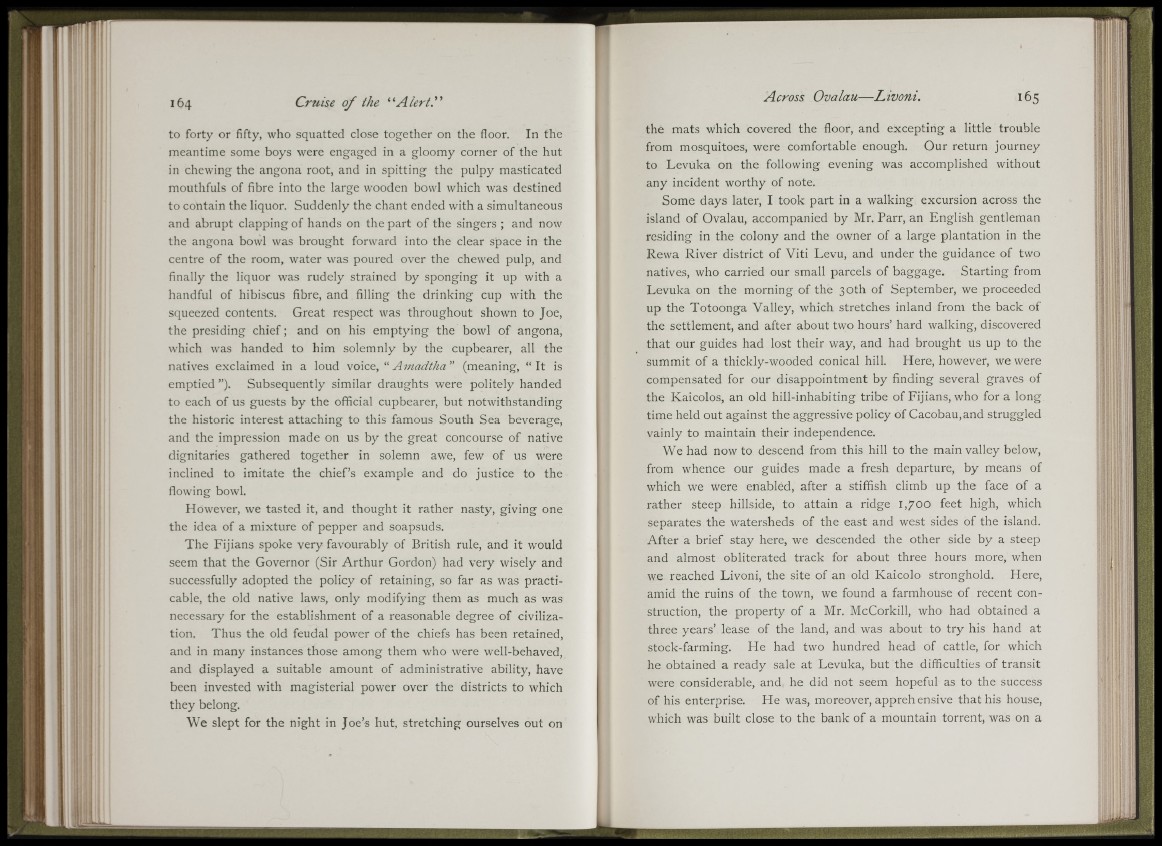
I
!'Ei
i!
i f
tl' ,
ill
III
to forty or fifty, who squatted close together on the floor. In the
meantime some boys were engaged in a gloomy corner of the hut
in chewing the angona root, and in spitting the pulpy masticated
mouthfuls of fibre into the large wooden bowl which was destined
to contain the liquor. Suddenly the chant ended with a simultaneous
and abrupt clapping of hands on the part of the singers ; and now
the angona bowl was brought forward into the clear space in the
centre of the room, water was poured over the chewed pulp, and
finally the liquor was rudely strained by sponging it up with a
handful of hibiscus fibre, and filling the drinking cup with the
squeezed contents. Great respect was throughout shown to Joe,
the presiding chief; and on his emptying the bowl of angona,
which was handed to him solemnly by the cupbearer, all the
natives exclaimed in a loud voice, “ A niadtha ” (meaning, “ It is
emptied ”). Subsequently similar draughts were politely handed
to each of us guests by the official cupbearer, but notwithstanding
the historic interest attaching to this famous South Sea beverage,
and the impression made on us by the great concourse of native
dignitaries gathered together in solemn awe, few of us were
inclined to imitate the chief’s example and do justice to the
flowing bowl.
However, we tasted it, and thought it rather nasty, giving one
the idea of a mixture of pepper and soapsuds.
The Fijians spoke very favourably of British rule, and it would
seem that the Governor (Sir Arthur Gordon) had very wisely and
successfully adopted the policy of retaining, so far as was practicable,
the old native laws, only modifying them as much as was
necessary for the establishment of a reasonable degree of civilization.
Thus the old feudal power of the chiefs has been retained,
and in many instances those among them who were well-behaved,
and displayed a suitable amount of administrative ability, have
been invested with magisterial power over the districts to which
they belong.
We slept for the night in Joe’s hut, stretching ourselves out on
165
the mats which covered the floor, and excepting a little trouble
from mosquitoes, were comfortable enough. Our return journey
to Levuka on the following evening was accomplished without
any incident worthy of note.
Some days later, I took part in a walking excursion across the
island of Ovalau, accompanied by Mr. Parr, an Lnglish gentleman
residing in the colony and the owner of a large plantation in the
Rewa River district of Viti Levu, and under the guidance of two
natives, who carried our small parcels of baggage. Starting from
Levuka on the morning of the 30th of September, we proceeded
up the Totoonga Valley, which stretches inland from the back of
the settlement, and after about two hours’ hard walking, discovered
that our guides had lost their way, and had brought us up to the
summit of a thickly-wooded conical hill. Here, however, we were
compensated for our disappointment by finding several graves of
the Kaicolos, an old hill-inhabiting tribe of Fijians, who for a long
time held out against the aggressive policy of Cacobau, and struggled
vainly to maintain their independence.
We had now to descend from this hill to the main valley below,
from whence our guides made a fresh departure, by means of
which we were enabled, after a stiffish climb up the face of a
rather steep hillside, to attain a ridge 1,700 feet high, which
separates the watersheds of the east and west sides of the island.
After a brief stay here, we descended the other side by a steep
and almost obliterated track for about three hours more, when
we reached Livoni, the site of an old Kaicolo stronghold. Here,
amid the ruins of the town, we found a farmhouse of recent construction,
the property of a Mr. McCorkill, who had obtained a
three years’ lease of the land, and was about to try his hand at
stock-farming. He had two hundred head of cattle, for which
he obtained a ready sale at Levuka, but the difficulties of transit
were considerable, and he did not seem hopeful as to the success
of his enterprise. He was, moreover, appreh ensive that his house,
which was built close to the bank of a mountain torrent, was on a
,1
Skf